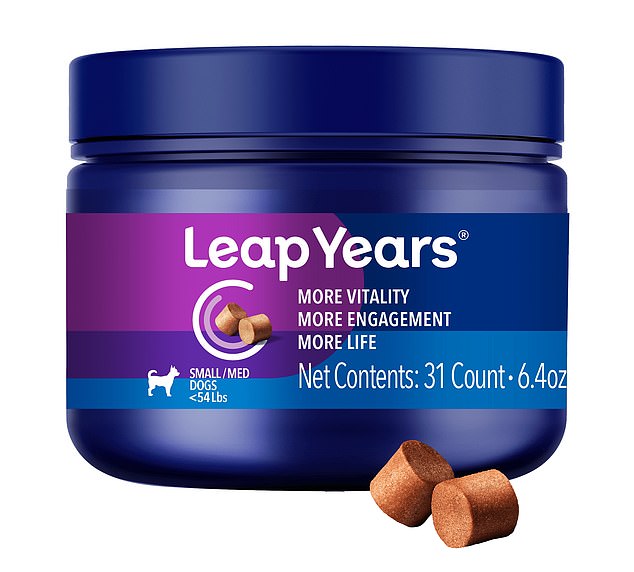
David Sinclair, a renowned geneticist and longevity researcher at Harvard University, is behind the dog supplement
A Harvard professor is selling a pill that he claims has been shown to “reverse aging” in dogs.
Dr. David Sinclair, a geneticist and longevity researcher, is the founder and co-owner of Animal Biosciences pill, a meat-flavored soft chew given to dogs three times a day.
While the drug has been on sale in the US for more than a year, it is only now gaining widespread attention after Sinclair claimed in X that iIt has been shown to “reverse aging” in dogs.
But other scientists have said his claim is “95 percent exaggerated” because of problems with the study.
It comes as the FDA approved a different drug that claims to extend a dog’s lifespan by at least a year.


The pill, called LeapYears, is sold by the veterinary supplement company Animal Bioscience, which Dr. Sinclair founded and runs with his brother, Nick Sinclair.


The pill showed a small improvement in the dogs’ cognitive function after three months of treatment, an effect that later disappeared.
The data Sinclair used to support his claims is a preprint study published last week, which has not been peer-reviewed.
The pill, called LeapYears, showed a small improvement in the dogs’ cognitive function after three months of treatment, an effect that later disappeared.
The supplement is a combination of NAD+ precursor and senolytic.
NAD+, also known as nicotinamide adenine dinucleotide, is an enzyme found in all living cells and is key to metabolism. It is abundant in children, stimulates metabolism and seems to keep cells cool.
The amount of enzyme in our body decreases with age. According to research, as it decreases, the risk of developing diseases such as type 2 diabetes, heart disease and Alzheimer’s disease increases.
The canine supplement works at the cellular level to restore dogs’ health by improving NAD+ production and eliminating damaged cells, Sinclair says.
Aging cells consume excessive amounts of NAD+, which depletes the cells’ reserves.
‘LeapYears supports the natural removal of cells that are no longer functioning properly, leaving room for healthier ones to use NAD+ more efficiently. It is the only supplement for dogs that targets and eliminates aging and damaged cells to help dogs age better.’
Over the years, there has been a lot of excitement around the enzyme NAD+, with dozens of scientists claiming to have evidence that NAD+ slows aging in animals by boosting the creation of new cells, and just as many critics saying the evidence is weak.
Richard Miller, a longevity researcher at the University of Michigan, told STAT that Animal Bioscience and Dr. Sinclair’s claims were “95 percent exaggerated.”
He noted that the study failed to adequately randomize the animals because the dogs in the different test groups did not start with the same average score on the cognition test.
The study examined 59 dogs and evaluated the impact of the drug versus a placebo on measures of aging, including cognitive function, activity level and mobility.
Only cognitive function showed a difference, while activity level and mobility were the same in the treatment and placebo groups.
The pill costs up to $117 for a one-month supply.
Meanwhile, Loyal, a San Francisco biotechnology company, received confirmation from the FDA last year that data on its dog pill, LOY-001, support “reasonable expectations of efficacy.”
This landmark FDA decision brings Loyal one step closer to allowing veterinarians to begin prescribing the longevity drug to our four-legged friends.
LOY-001 is one of three drugs the company is working on and is expected to launch in 2026.
Their goal is to target a cellular mechanism in dogs to extend the healthy lifespan of large and giant breeds, which age faster and have shorter lifespans than smaller breeds.
